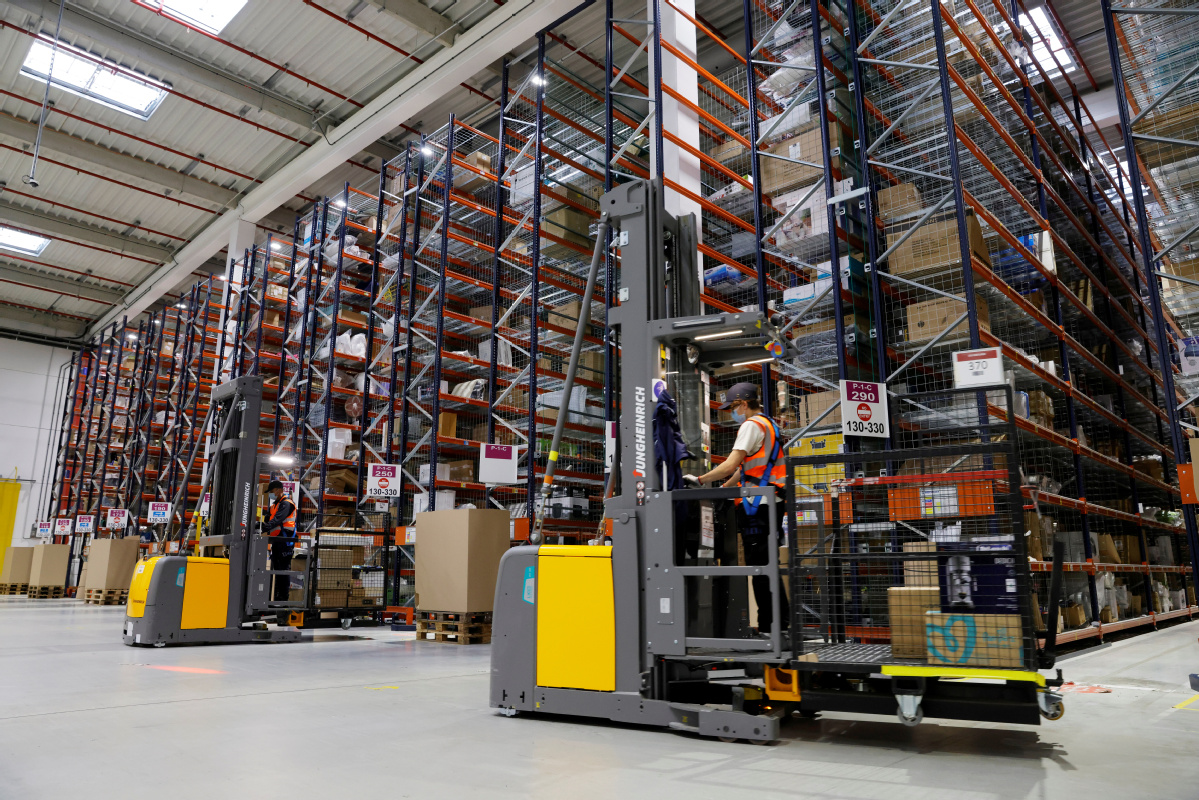E-commerce eyes Black Friday windfall


COVID curbs on travel, liking for high-quality products may further boost consumption
Cross-border e-commerce platforms are looking to cash in on anticipated shopping spree on Black Friday, which falls on Nov 27.
Chinese consumers, especially those living in lower-tier cities, display a fast-growing purchasing power and a certain liking for buying high-quality products online as COVID-19 has hindered transnational travel, unlike in the past when Chinese tourists would travel abroad with shopping, cultural experiences and sightseeing on their mind.
US-based e-commerce giant Amazon has kicked off its longest-ever Black Friday shopping festival by offering more than 30 million authentic commodities covering over 480,000 international brands from four overseas sites in the United States, the United Kingdom, Japan and Germany. It has also quickened its logistics and delivery operations.
Li Yanchuan, vice-president of Amazon China, said Chinese consumers have fewer opportunities to go abroad due to the impact of the pandemic. But their demand for overseas products still exists. "They have shown soaring enthusiasm and vibrant purchasing power for cross-border online shopping."
Li said the young generation in the 25-34 age-group account for 49 percent of consumers who buy imported products, while the proportion of residents of lower-tier cities in the total is continuously increasing.
According to a report from Amazon and DT Caijing, which is a part of news outlet Yicai, cosmetics and personal care products are gaining traction among middle-income consumers, with horticultural products, furniture and electronic digital goods witnessing the most rapid growth during last year's Black Friday sales gala.
Beauty makeup, personal care, small home appliances and watches were among the top 10 products in term of sales on Amazon Global Store, its cross-border shopping platform. Moreover, niche and highend brands such as DeLonghi and Marshall are favored by consumers from lower-tier cities and townships.
Black Friday, which marks the start of the Christmas shopping season in the West, is a manic shopping day featuring deep discounts. In recent years, it has evolved into a bonanza for brick-and-mortar retailers, e-commerce players and consumers from around the world.
An increasing number of Chinese consumers have participated in the global shopping festival in recent years.
Ymatou, a Shanghai-based cross-border e-commerce site, will seek to provide a more diversified cross-border shopping service during this year's Black Friday carnival. It is offering red packets (hongbao), coupons and discounts to consumers, 1 billion yuan ($152 million) in innovative loans to buyers overseas purchasing on behalf of consumers in China, as well as using livestreaming promotions at overseas outlets, discount stores and duty-free shops.
Zeng Bibo, founder and chief executive officer of Ymatou, said affected by the pandemic, Chinese consumers' demand for overseas shopping is suppressed, so cross-border e-commerce platforms have become a new channel to satisfy their preference for imported and high-quality commodities.
Founded in 2010, Ymatou employs more than 80,000 overseas buyers in 83 countries, including the US, the UK, Japan, South Korea and Australia.
In addition, xLobo, the cross-border logistics arm of Ymatou, said it will operate more than 40 chartered airplanes that will fly to South Korea, Japan, Europe and North America, and provide nearly 20 overseas warehouses and bonded warehouses that cover more than 500,000 square meters for overseas buyers.
"Cross-border e-commerce platforms hope to grasp the opportunities arising from the unfading enthusiasm of consumers," said Mo Daiqing, a senior analyst at the Internet Economy Institute, a domestic consultancy.
Black Friday as a cross-border shopping carnival has been growing in popularity in China as more and more Chinese consumers scout for high-quality products from abroad, Mo said, adding they could snap up some winter apparel during the promotion event.
"The cross-border e-commerce has played a positive role in enriching domestic products supply, bolstering the development of new business models, and better meeting the needs of residents," Mo said.
Market consultancy iiMedia Research said the transaction scale of the country's cross-border online shopping is expected to rise from 10.8 trillion yuan in 2019 to 12.7 trillion yuan this year.
Meanwhile, as the cases of COVID-19 continue to climb overseas, experts warn that cross-border logistics and cold chain transportation would be a focal point in preventing a rebound of the COVID-19 pandemic in China this winter, considering the number of parcels from abroad might see a surge after Friday.
Wu Zunyou, chief public health researcher at the Chinese Center for Disease Control and Prevention, said the entire environment of international freight in winter can be compared to the cold chain in summer. The virus can survive longer on the surface of containers and product packaging, which increases the risk of people becoming infected, he noted.
China's imported goods market saw rapid development after COVID-19 subsided mid-year, opening up new opportunities for retail digitization, according to a report released by consultancy Deloitte China, and Tmall Global, Alibaba's cross-border e-commerce arm.
The imported products have penetrated into lower-tier cities, with demand for overseas goods rising in third-tier and lower cities, the report said.
"With the expanding domestic demand and advances in emerging retail technologies, China has introduced preferential policies, like lower import taxes, and expanded the allowed range of imported goods. This has prompted a surge in cross-border e-commerce imports despite the pandemic, underlining a period of rapid growth for China's imported goods market," said Zhang Tianbing, head of Deloitte Asia-Pacific consumer product and retail sector.
Zhang said the post-lockdown "revenge spending" has fueled the consumption of imported goods from popular travel destinations. "Overseas brands are moving to cross-border e-commerce platforms as they expand their distribution channels in light of disruptions to offline retail."




































